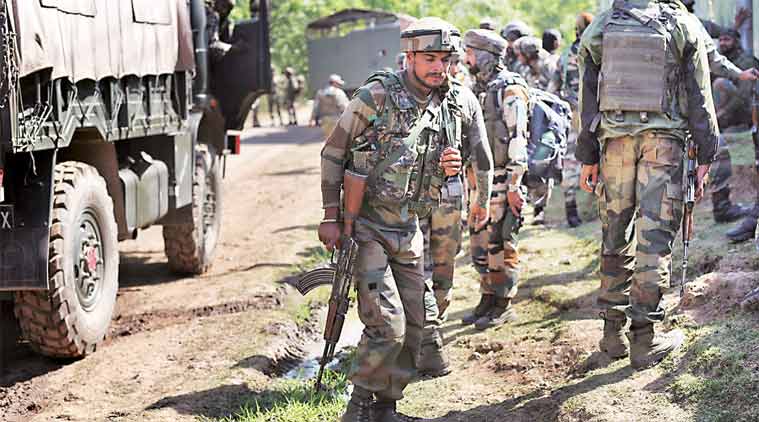 The undemocratic culture of stone-pelting should not be tolerated at any cost, the Organiser editorial says. (Files)
The undemocratic culture of stone-pelting should not be tolerated at any cost, the Organiser editorial says. (Files)
Firm hand in J&K
The editorial in Organiser analyses the breakdown of the BJP-PDP alliance in Jammu and Kashmir. The editorial says if one looks at the sequence of events — the murder of a prominent journalist, the abduction and killing of a soldier, the continued killings during the Ramzan ceasefire, the United Nations Human Rights Commission (UNHRC) report on the human rights situation in Kashmir — the break-up appears neither “abrupt” nor “unexpected”.
The editorial recalls that BJP leader Ram Madhav, while terming the alliance as “untenable”, had spoken about the development of all the three divisions of the state. “On the other hand, the former Chief Minister Ms Mufti enlisted achievements like [having] preserved Article 370 of the Constitution, stood strong in defence of Article 35 (A) and withdrawn the cases against 11,000 first-time stone-pelters”. She also took credit for discontinuing army operations during Ramzan. This clearly depicts the contradiction in the approach of the two parties towards governance in the state, the editorial argues. These contradictions made the alliance “untenable” for the BJP, in the context of national security and in terms of realpolitik. The editorial goes on to argue that the contradictions sharpened after the manufactured outrage over the “Kathua case”.
Organiser has called for a firm hand in dealing with the miscreants and the creation of a legitimate space for nationalist voices. The undemocratic culture of stone-pelting should not be tolerated at any cost, the editorial says. “The government has already rejected the so-called human rights concerns raised by the UNHRC as biased, so no need to worry about the rights of the people who believe in violence and terrorism,” editorial says.
RSS and Emergency
An article in Organiser says a comprehensive history of the Emergency is yet to be written. The available ones have neglected or consciously erased the role played by the RSS. Books by journalists, academic histories and the many memoirs and autobiographies all have this limitation, according to the article. These accounts of the Emergency are often personalised and focused on the causes and consequences and do not trace the history of the 21 months in detail. It recalls a remarks by the third RSS sarsanghchalak, Balasaheb Deoras, who said, “One man, Jai Prakash, and the RSS stood between the dictatorship and democracy”.
The Economist, according to the article, wrote: “The underground campaign against Mrs Gandhi claims to be the only non-left wing revolutionary force in the world, disavowing both bloodshed and class struggle. Indeed, it might even be called right-wing since it is dominated by the Hindu communalist party, Jan Sangh and its ‘cultural’ (some say paramilitary) affiliate, the RSS. But its platform at the moment has only one non-ideological plank; to bring democracy back to India.” The Organiser article adds that according to The People Versus Emergency: A saga of struggle, 23,015 RSS swayamsevaks and activists, including 77 women, were detained under MISA. It claims that while 44,964 RSS activists were arrested for offering satyagrah during the Emergency, only 9,655 activists of other parties offered satyagrah. “These sacrifices were not just for the sake of activism! It was the ‘second freedom struggle’ for the Sangh. The organisation never profiled itself as some distinct entity, but it was a manifestation of people’s power and their struggle in safeguarding the democracy. It was not a coincidence that RSS decided not to avail any benefits offered to its swayamsevaks, especially the pracharaks, detained under MISA during the Emergency by the government,” the article argues. It also claims that the main target of Indira Gandhi was the RSS because she believed the Sangh provided all the logistic support to the JP movement in Bihar and Gujarat. The article claims that Indira Gandhi had planned to ban the RSS even before the Emergency was declared.
Rajnath’s interview
Days after the BJP-PDP government fell, Union Home Minister Rajnath Singh, in an interview to Panchjanya, claimed that the Narendra Modi government’s decisions will prove to be decisive in Kashmir. Singh said the recent developments in J&K are a refutation of the allegation that the BJP was under pressure from the PDP. Singh said the agenda for Kashmir could not be distinct from the national agenda. On Delhi Chief Minister Arvind Kejriwal’s claim that the Centre was not co-operating with the state government, Singh said the Union government was executing its responsibilities. He said the chief minister’s allegation that IAS officers were not doing their job was unfortunate. “I believe that such a stand-off between an elected government and the bureaucracy had never happened in the past,” Singh said. He said the Delhi chief minister must reflect on why such a situation arose.
Compiled by Lalmani Verma